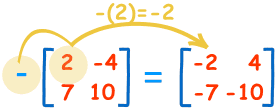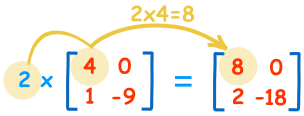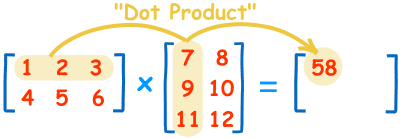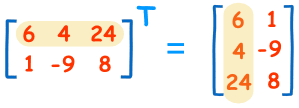Sunday, 19 February 2017
Sunday, 22 January 2017
11th grade
Here is a short breif explanation of matrices
A Matrix is an array of numbers:

A Matrix
(This one has 2 Rows and 3 Columns)
We talk about one matrix, or several matrices.
There are many things we can do with them ...
Adding
To add two matrices: add the numbers in the matching positions:

These are the calculations:
| 3+4=7 | 8+0=8 |
| 4+1=5 | 6-9=-3 |
The two matrices must be the same size, i.e. the rows must match in size, and the columns must match in size.
Example: a matrix with 3 rows and 5 columns can be added to another matrix of 3 rows and 5 columns.
But it could not be added to a matrix with 3 rows and 4 columns (the columns don't match in size)
Negative
The negative of a matrix is also simple:

These are the calculations:
| -(2)=-2 | -(-4)=+4 |
| -(7)=-7 | -(10)=-10 |
Subtracting
To subtract two matrices: subtract the numbers in the matching positions:

These are the calculations:
| 3-4=-1 | 8-0=8 |
| 4-1=3 | 6-(-9)=15 |
Note: subtracting is actually defined as the addition of a negative matrix: A + (-B)
Multiply by a Constant
We can multiply a matrix by some value:

These are the calculations:
| 2×4=8 | 2×0=0 |
| 2×1=2 | 2×-9=-18 |
We call the constant a scalar, so officially this is called "scalar multiplication".
Multiplying by Another Matrix
But to multiply a matrix by another matrix we need to do the "dot product" of rows and columns ... what does that mean? Let us see with an example:
To work out the answer for the 1st row and 1st column:

The "Dot Product" is where we multiply matching members, then sum up:
(1, 2, 3) • (7, 9, 11) = 1×7 + 2×9 + 3×11 = 58
We match the 1st members (1 and 7), multiply them, likewise for the 2nd members (2 and 9) and the 3rd members (3 and 11), and finally sum them up.
Want to see another example? Here it is for the 1st row and 2nd column:

(1, 2, 3) • (8, 10, 12) = 1×8 + 2×10 + 3×12 = 64
We can do the same thing for the 2nd row and 1st column:
(4, 5, 6) • (7, 9, 11) = 4×7 + 5×9 + 6×11 = 139
And for the 2nd row and 2nd column:
(4, 5, 6) • (8, 10, 12) = 4×8 + 5×10 + 6×12 = 154
And we get:

DONE!
Dividing
And what about division? Well we don't actually divide matrices, we do it this way:
A/B = A × (1/B) = A × B-1
where B-1 means the "inverse" of B.
So we don't divide, instead we multiply by an inverse.
And there are special ways to find the Inverse ...
Transposing
To "transpose" a matrix, swap the rows and columns. We put a "T" in the top right-hand corner to mean transpose:

Notation
A matrix is usually shown by a capital letter (such as A, or B)
Each entry (or "element") is shown by a lower case letter with a "subscript" of row,column:

 | Rows and Columns
So which is the row and which is the column?
To remember that rows come before columns use the word "arc":
ar,c
|
Example:
| B = |  |
Here are some sample entries:
b1,1 = 6 (the entry at row 1, column 1 is 6)
b1,3 = 24 (the entry at row 1, column 3 is 24)
b2,3 = 8 (the entry at row 2, column 3 is 8)
Saturday, 21 January 2017
Week 2
Hey you guys hope you are enjoying your weekend the following below is basically the schedule for next week.7th grade:
On Monday we will do a breif discussion on adding and subtracting rational numbers and then go to multiplying integers. Wednesday we will do dividing integers
8th grade
On Tuesday we will finish fraction sense and on Thursday we will go on to the next chapter
11th grade
Tuesday we will start Matrices
Please remember to bring your report card grades and the short answer on why you join my club.please and thank you. God bless😊😊
Subscribe to:
Comments (Atom)




